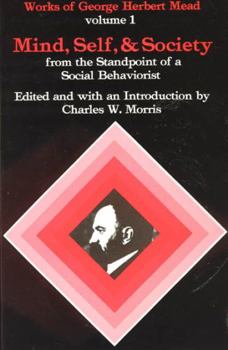Mind, Self, and Society: From the Standpoint of a Social Behaviorist
Select Format
Select Condition 
Book Overview
George Herbert Mead is widely recognized as one of the most brilliantly original American pragmatists. Although he had a profound influence on the development of social philosophy, he published no... This description may be from another edition of this product.
Format:Paperback
Language:English
ISBN:0226516687
ISBN13:9780226516684
Release Date:August 1967
Publisher:University of Chicago Press
Length:440 Pages
Weight:0.97 lbs.
Dimensions:0.9" x 5.2" x 8.3"
Customer Reviews
3 ratings
Why Not Call it Philosophy?
Published by Thriftbooks.com User , 15 years ago
I came to this book after reading, and loving, alot of Erving Goffmann... Although he's called a sociologist, I really don't understand why he's not classified as a philosopher, since this book, in particular, seems more like a work of then any other discpline. Mead's essential thesis- that individuality exists only after society, and its collalary, that intelligence is characterized by the anticipation of other's reactions to one's behaviors or "gesture", seems to belong more to the discipline of philosophy then to pyschology or sociology. Maybe chalk it to the american disdain for philosophy and the growth of speciailzation within the north american university system? This book is brilliant- but I found this edition to be lacking. It's basically a reprint of the orginal text, replete with footnotes that are printed in 6 point type. What is that- sadism? Why would you do that to a footnote in 2009? It basically meant that I skipped all the footnotes because i was afraid of hurting my eyesight, and that sucks, because it's totally avoidable. I hold University of Chicago responsible, and if anyone there is reading this- put out a better edition.
A brilliant book
Published by Thriftbooks.com User , 15 years ago
Until I read Mead's Mind, Self, and Society I couldn't get past mind/body dualism. Great authors rejected it; none, to my limited knowledge, endorsed it. But none were able to convincingly explain it away. Mead, however, though it was not his stated intention, dispels mind/body dualism quite easily. He does so by first giving priority to the organism, something that his contemporary followers, known as symbolic interactionists, seem not to understand. Mead then acknowledges that human beings have a central nervous system possessed of the neurological equipment needed for symbolic functioning, something not shared by other organisms, except in rare instances and in rudimentary form. Beyond that, human beings are actively sensate organisms who participate in social settings where mutually interpretable symbols -- especially in the form of language -- are in routine use. It is in such social settings that we acquire the symbolic wherewithal needed for communication with others and for thinking, an internal conversation that we have with ourselves. It is in such social settings that we acquire an individuated self. When speaking of acquiring language or any other capability, Mead is fond of using the expression "reorganization of the central nervous system." For Mead, inevitably, that is what learning is, and again we see that he has good reason to give priority to the organism. Mead's take on the concept attitude is especially interesting. He defines an attitude as a repertoire of behaviors which gives value to the environment. A car is a valuable means of transportation if we know how to drive it. Otherwise it's worthless. We need a socially learned repertoire of behaviors to give it value. Mead does not use the term sub-conscious, certainly not in the way that Freud did. Nevertheless, as socially learned behavioral repertoires become automatically responsive to specific stimuli, a richly endowed sub-conscious is created, made manifest through reorganization of the central system. This is the subconscious according to a social behaviorist The first fifty or so pages of Mind, Self, and Society make for difficult reading. After that, however, the material becomes easier, in part because Mead illustrates the same concept again and again in different ways. Each time, it seems, the reader acquires a more subtly nuanced understanding of Mead's ideas. Mead's work is replete with brilliant insights. It deserves reading and re-reading.
The founding stone of symbolic interactionist theory
Published by Thriftbooks.com User , 19 years ago
This books represents the foundation for a major sociological approach - symbolic interactionism. The essential premise of symbolic interactionism is that all human action is essentially symbolic and that society is to be understood, not as a closed system to be studied in abstraction, but as a network of endless interactions in which human beings symbolically interpret human behavior, speech and thought. Society is the interiorised 'other' or a projected interpretation of societal 'others'. Human self therefore has a free component or I and a bound component or We. This book is an essential reading for whosoever wants to understand sociology and also the departure of Anglo-American sociology from 'society as a system' approaches. And above all it is a timeless classic that you can enjoy reading for the sheer insights it throws into social behavior.






